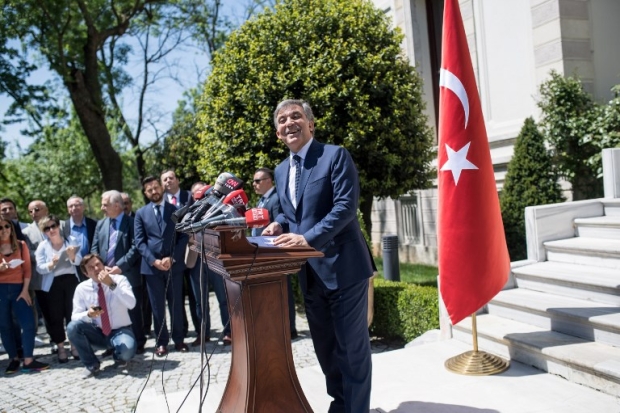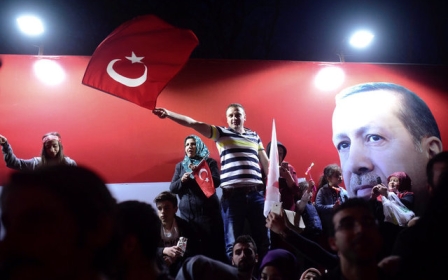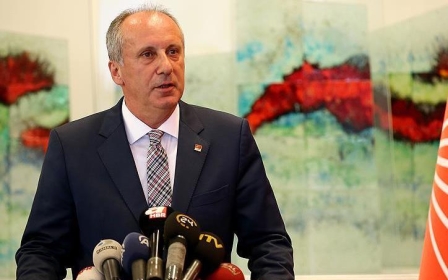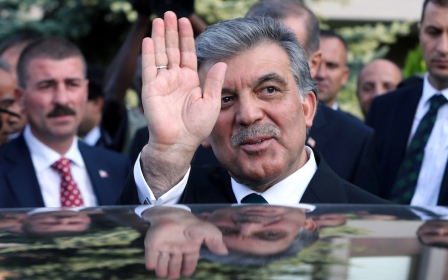Turkey elections: Why Abdullah Gul's bid to challenge Erdogan failed
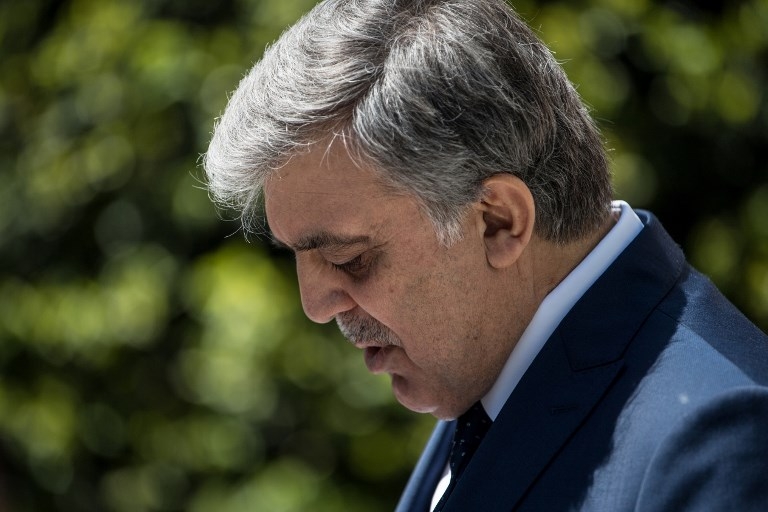
The press conference given by former Turkish foreign minister and Prime Minister Ahmet Davutoglu on 26 April was arranged in haste, but his language was deliberate and unequivocal.
Davutoglu said that he never considered relinquishing his membership of the Justice and Development Party (AKP), that the party chose President Recep Tayyip Erdogan as its candidate for the presidential election, and that he would therefore support the president in the vote.
For several days, Davutoglu’s position on the election had been a subject of speculation. The university professor, who was invited by AKP founders to join them in the political arena more than a decade and a half ago, enjoys popularity among two important segments of the electorate: the urban conservative middle class and conservative Kurds.
A call for support
On 23 April, Davutoglu received former Turkish president Abdullah Gul in Istanbul. It is certain that Gul asked Davutoglu for his support in the election battle. However, the latter, who affirmed his friendship and respect for the former president, asserted his adherence to the position of the AKP, to which both men belonged.
In addition to several other developments, Davutoglu's refusal to offer support played a major role in frustrating the plan of Gul and his supporters, who imagined it might put an end to Erdogan's presidency and perhaps even his political life. Instead, it would seem that the former president and co-founder of the AKP is now heading towards years of dull retirement.
Gul never spoke to the nation, nor did he take into consideration the likely reaction of Turkey’s people
In 2002, upon the surprising rise to power of the newly formed AKP, Gul headed the first government of the party since its leader, his colleague and friend Erdogan, was still under a court ruling imposing a political ban. A few months later, Erdogan won a seat in parliament and took charge of the government while Gul became foreign minister.
In 2007, although the position of the AKP in government was still insecure, Gul expressed a desire to run in the presidential election - but a coalition forged by the judiciary, the army and the Republican People’s Party (CHP) succeeded in preventing him from obtaining the necessary parliamentary majority. Gul's opponents waged this battle in the name of barring his wife, who wore a headscarf, from entering the presidential palace. They aimed to use Gul's defeat as a first step towards bringing down the AKP.
Tensions rise
A number of AKP leaders might have reckoned that the party had rushed into nominating Gul and embarking on the quest for the presidency. But Erdogan did not recoil, calling for early elections that increased the number of the party’s seats in parliament, thus leading to Gul’s election as president.
Gul's presidency was characterised by a warm relationship between the president, who had limited powers, and the prime minister. Yet, that relationship was not without some tension.
In 2013, Gul, in contrast to Erdogan, showed some readiness to offer concessions to the demonstrators at Taksim Square. In 2014, his presidency came to an end, and Erdogan won the position in Turkey’s first direct presidential elections.
In the summer of 2016, Gul expressed solid support for Erdogan in the face of an attempted coup. Disagreements between the two men resurfaced last year, however, when the AKP government called for a referendum over constitutional amendments that transformed the Turkish state from a parliamentary to a presidential system.
During the few days that followed the announcement of holding early presidential and parliamentary elections on 24 June, Gul's name emerged as a likely candidate for challenging Erdogan. Formally, it was the Felicity Party, the successor to the Welfare Party that once included both Erdogan and Gul under the leadership of the late, legendary Necmettin Erbakan, that adopted the project of nominating Gul for the presidency.
Failure to secure consensus
In reality, the idea had been in circulation within the ranks of the CHP and conservative circles opposed to Erdogan. The idea of nominating Gul turned into a project for opposition parties of various ideological inclinations, in addition to a few alienated AKP members. A number of the latter group, including Besir Atalay, Saadallah Ergin and Ali Babacan, started to mobilise various political forces behind the former president.
There is no doubt whatsoever that Gul was content with that movement. His meeting with Davutoglu and his request for his support show that he took serious steps towards officially announcing his candidacy. Eventually, of course, Gul's supporters failed to secure the consensus of the opposition parties. It was inevitable for Gul to pull out before even entering the race.
Certainly, Gul could have entered the race irrespective of the number of political parties that supported his candidacy. In that case, he would have caused the elections not to be decided in their first round - and in the second round, all opposition forces would have undoubtedly rallied behind Gul.
But the former president is not known to be a fighter, and this is his inherent weakness. The other problem is that he began his move by talking to the political elite, concerned with mobilising the opposition parties behind his candidacy. Gul never spoke to the nation, nor did he take into consideration the likely reaction of Turkey’s people. In contrast, Erdogan was responding to his opponents by using a language that never missed its intended target, asserting that "it is the people who brought me to power, and the people alone have the right to choose their next president".
- Basheer Nafi is a historian of Islam and the Middle East.
The views expressed in this article belong to the author and do not necessarily reflect the editorial policy of Middle East Eye.
Photo: Former Turkish head of state Abdullah Gul speaks during a press conference on 28 April 2018 in Istanbul (AFP)
Middle East Eye propose une couverture et une analyse indépendantes et incomparables du Moyen-Orient, de l’Afrique du Nord et d’autres régions du monde. Pour en savoir plus sur la reprise de ce contenu et les frais qui s’appliquent, veuillez remplir ce formulaire [en anglais]. Pour en savoir plus sur MEE, cliquez ici [en anglais].



